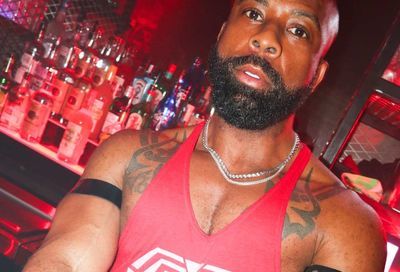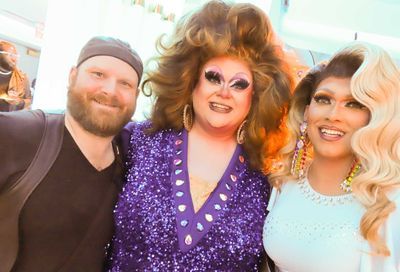Fighting for Recognition
A divided Supreme Court rules that student groups can be forced to take ''all comers'' if they want the benefits of formal recognition
The U.S. Supreme Court today held that a public university can require that student groups allow ”all comers” in order to receive the benefits of formal recognition. Such a requirement, a 5-4 majority led by Justice Ruth Bader Ginsburg decided, does not violate the First Amendment’s guarantees of freedom of speech or association.

Justice Ruth Bader Ginsburg
The case, Christian Legal Society v. Martinez, is the second time in as many weeks that LGBT-equality advocates found themselves on the winning side of a case at the high court. This morning, Ginsburg spoke about what she called a ”novel First Amendment question.”
The case arose from circumstances at the University of California-Hastings College of the Law, in which the Christian Legal Society (CLS) on campus refused to admit all students as members, primarily leading to an exclusion of those who engage in what is referred to as ”unrepentant homosexual conduct.” This violated the nondiscrimination policy of the school, as well as the more broad ”all comers” practice that all parties agreed was applied at the school, leading to the school’s refusal to grant CLS formal recognition.
This, CLS argued, was a violation of the students’ free-speech rights and associational freedoms. The university, which was sued by CLS, and Outlaw, the LGBT student group at the university who joined in the lawsuit, disagreed.
That Ginsburg was there on Monday might have been a surprise to some. As Chief Justice John Roberts noted at the outset of the court’s session, Ginsburg’s husband of more than 50 years, Martin, died June 27. The chief justice told the crowd assembled to hear the announcement of the final decisions of the term that Martin Ginsburg, a celebrated tax attorney, ”was as loving as he was gifted.”
The day also was notable for it likely was Justice John Paul Stevens’s last day on the bench, having announced his retirement earlier this year. The confirmation hearings for President Obama’s nominee for Stevens’s replacement, Solicitor General Elena Kagan, began a little more than an hour after the court recessed.
Despite the unusual circumstances of the day, all nine Supreme Court justices were there as Ginsburg told the audience that the question before the court was: ”May a public law school condition official recognition of a student group on the group’s agreement to open membership to all students who want to join?”
The court’s answer, she said, was yes, adding, ”to meet First Amendment [requirements], the school need not provide a religion-based exception.”
The National Center for Lesbian Rights, which – along with Paul Smith at Jenner & Block – represented Outlaw, praised the ruling.
”Today’s decision affirmed the longstanding doctrine that university nondiscrimination policies do not violate free speech when applied in a consistent and evenhanded way,” NCLR senior attorney Christopher Stoll said. ”The court rejected the dangerous argument that anti-gay groups must be given a special exemption from nondiscrimination policies.”
The ”dangerous argument” was, however, supported by four of the court’s members, with Justice Samuel Alito writing a dissenting opinion for himself, Roberts and Justices Antonin Scalia and Clarence Thomas.
Alito argued that the principle behind the court’s majority opinion was that there is ”no freedom for expression that offends prevailing standards of political correctness in our country’s institutions of higher learning.” He wrote that the court’s decision ”arms public educational institutions with a handy weapon for suppressing the speech of unpopular groups — groups to which, as Hastings candidly puts it, these institutions ‘do not wish to … lend their name[s].”’
Stevens, in one of his last opinions before his retirement, agreed with Ginsburg’s opinion but wrote separately as well, countering some of Alito’s arguments with blunt statements that struck at the heart of the case.
”CLS, in short, wanted to receive the school’s formal recognition — and the benefits that attend formal recognition,” Stevens wrote, ”while continuing to exclude gay and non-Christian students (as well as, it seems, students who advocate for gay rights).”
Justice Anthony Kennedy, who also agreed with Ginsburg’s opinion, added an opinion of his own focusing on the role of student groups in a college environment.
”A school quite properly may conclude that allowing an oath or belief-affirming requirement, or an outside conduct requirement, could be divisive for student relations and inconsistent with the basic concept that a view’s validity should be tested through free and open discussion.”
Stevens also fought back against what he saw as the distorted view from the dissenting justices that the opinion ”point[s] a judicial dagger” at religious groups in America.
”Although the dissent is willing to see pernicious antireligious motives and implications where there are none,” Stevens wrote in a footnote, ”it does not seem troubled by the fact that religious sects, unfortunately, are not the only social groups who have been persecuted throughout history simply for being who they are.”
The case has been sent back to the Ninth Circuit Court of Appeals, which must decide several secondary arguments not resolved by the Supreme Court opinion.
Support Metro Weekly’s Journalism
These are challenging times for news organizations. And yet it’s crucial we stay active and provide vital resources and information to both our local readers and the world. So won’t you please take a moment and consider supporting Metro Weekly with a membership? For as little as $5 a month, you can help ensure Metro Weekly magazine and MetroWeekly.com remain free, viable resources as we provide the best, most diverse, culturally-resonant LGBTQ coverage in both the D.C. region and around the world. Memberships come with exclusive perks and discounts, your own personal digital delivery of each week’s magazine (and an archive), access to our Member's Lounge when it launches this fall, and exclusive members-only items like Metro Weekly Membership Mugs and Tote Bags! Check out all our membership levels here and please join us today!




















